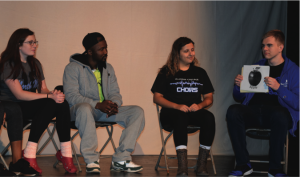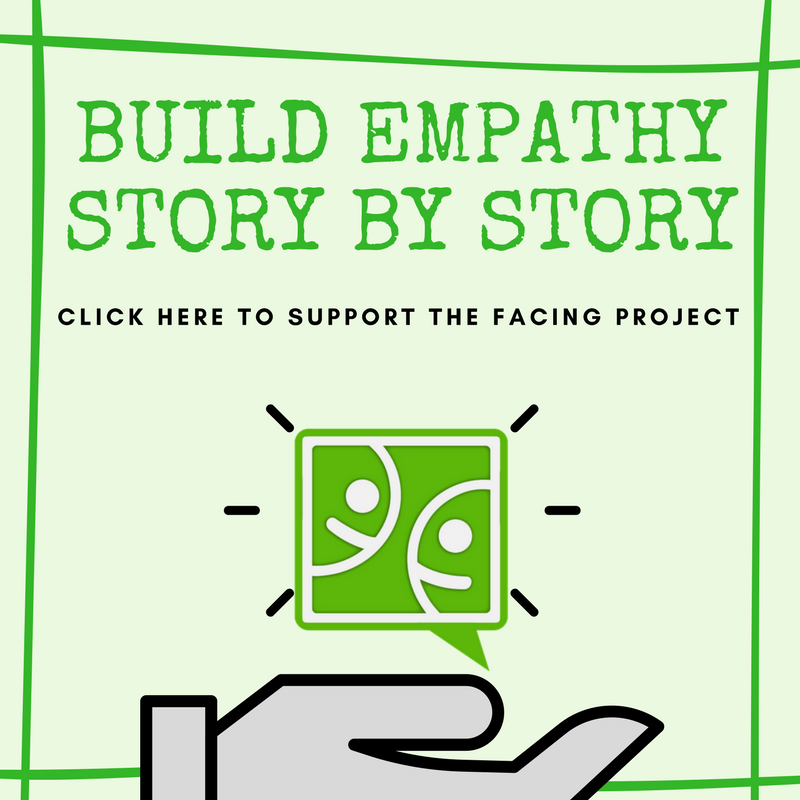Just because someone is from another country doesn’t mean they need to earn our respect or support. We shouldn’t make them feel unwanted or unworthy of being here just because they can’t speak English perfectly. Our country is supposed to accept people and not shun them for a belief or religion. It’s our job as Americans to accept them for the people they are. Here’s part of a story done through The Facing Project. Read it, share it, remember it. It’s gives us a look into the minds of people who are from another country while they try to adapt. Find the rest of this project, and many like it, at https://facingproject.com/facing-communities/
Excerpt from From the Congo To Jacksonville: A Facing Project
SCENE 3: LANGUAGE BARRIERS
(Airplane/airport noise. MCABRAHAM enters, in America for the first time, and speaks to the audience.)
MCABRAHAM: When I got to America, I first found it very confusing.
(Lights expand to the entire stage as several Americans in business attire/casual attire are quickly walking all over the stage, imitating a busy airport.)
LAUREN: My boss has got me in a corner. I don’t know how I’m going to meet this deadline.
YUHUA: I know what you mean. I’m fighting to keep my head above water.
SIERRA: Starbucks has the most amazing bear claws.
MAKENZIE: Yeah, last time I got a latte mocha skinny chocolate frappe.
MASON: I told her, “Your job is easy. It’s like shooting fish in a barrel. How can you not transfer the call?!”
MICHAEL: Yeah, I’m pissed at her too.
(Everyone but MCABRAHAM leaves the stage.)
MCABRAHAM: Everyone spoke English so quickly and used words in ways I didn’t understand. I felt lost . . .
(Students and Teacher enter and form a circle. MCABRAHAM joins the circle. The group is listening to the teacher. The teacher holds up a series of fruit pictures. Throughout, the Congolese repeat the words in English.)
TEACHER: Apple. La pomme. Apple. Banana. It’s almost the same in French. And lemon.
JC: Le Citron?
TEACHER: Yes. Lemon. Alright, the class is finished for the day.
(Everyone in the scene freezes but MCABRAHAM, who faces the audience.)
MCABRAHAM: I have been taking language learning classes along with the other men and women who came to America from the DRC. It’s helping a little, but the language barrier is still a big part of our lives. The language is the key. Without English, you cannot integrate into life here.
(MCABRAHAM joins the scene as the Teacher begins to put away his lesson materials.)
TEACHER: Now, Professor Taylor Porter’s students are interested to know about your move from the Congo to Jacksonville. Would it be okay if they asked a few questions?
(Group of Congolese students nod their head yes.)
SIERRA: We all are very curious to know, how has the language barrier affected your opportunities here?
CEPHAS: English . . . to try to find a job. I have hard time to get good job. To get a job like . . . like a job I have home, like I do in Africa, I would have to go back to school. I used to work at U.S. Bank programming computers. To go to school again, I have to know English. That’s why, uh, a lot of African, African people, they can work at JBS, the meat- packing plant. At JBS they don’t need people who speak English. They just need people who will like, give their hands.
(Lights fade on the class. As MCABRAHAM stands up, the language learning class freezes as he walks toward the audience. On the other side of the stage, a Congolese man who represents MCABRAHAM enters the grocery store and begins to shop around. As MCABRAHAM speaks, the action is performed in front of the audience by the past version of MCABRAHAM [JEFFREY] and a Walmart employee.)
MCABRAHAM: In the beginning, every time I would go shopping, someone would come to me. I would get so frightened because I didn’t know English. I would be shopping when the worker would say:
EMPLOYEE: How can I help you?
(JEFFREY runs away, scared.)
MCABRAHAM: And I would be so afraid. Every time I see someone approaching me, I would have to run away because I was scared. I was scared I wouldn’t know what to say if they asked me a question in English. Now, if I go shopping somewhere, like Walmart.
(JEFFREY enters the grocery store and begins to shop around again), I am not scared if she asks me a question.
EMPLOYEE: How can I help you?
JEFFREY: Can you tell me where the red peppers are?
EMPLOYEE: In the corner of the produce section near the bakery.
JEFFREY: Thank you. (JEFFREY smiles at the audience and follows her direction, exiting with the employee.
MCABRAHAM smiles as he joins the class, and the class un-freezes.)
LAUREN: How about you? How has the language barrier impacted your opportunities?
HATEEYAT: Please?
LAUREN: How has the language barrier impacted your opportunities?
HATEEYAT: It’s English, the language?
LAUREN: Yes.
HATEEYAT: How it impacts me now, yes?
LAUREN: How is it affecting you, and your opportunities?
HATEEYAT: Yes, I don’t . . . I don’t know. I have forced myself to learn a little English.
LAUREN: If you’re trying to learn English, how do you balance studying with working?
HATEEYAT: If I’m trying to work and speak English? I’m stuck. The JBS work and English learning too hard. I try and try but can’t get better. My job need no English.
YUHUA: How about you?
(The Congolese person looks confused. The teacher then asks him the question in French.)
TEACHER: La barrière de la langue vous a-t-elle affecté?
JC: C’est dif cile de parler avec un traducteur. Parler avec un traducteur, on ne peut pas s’adresser directement. Les gens ne se sentent pas liées. Dans certains contextes, ça bloque entièrement la communication. Quand on peut communiquer facilement, ça ouvre d’autres portes pour nous, autres horizons.
TEACHER: He said it’s hard to speak through a translator. Speaking all the time through a translator, you can’t be direct. People don’t feel connected to you. In certain situations, it completely blocks communication. Once you can communicate easily, that opens other doors, other horizons.
YUHUA: If you are trying to learn English, how do you balance studying and working?
TEACHER: Étudiez-vous l’anglais? Est-il dif cile de trouver l’équilibre entre vos études et votre travail?
JC: J’essaie d’apprendre l’anglais et j’étudie l’anglais, mais le problème c’est le temps. Je reviens à la maison à minuit, minuit et demi. À une heure de l’après-midi, le lendemain, je suis de retour au travail.
TEACHER: He said he is trying to learn English and is studying English, but the problem is time. He comes home at twelve, twelve-thirty at night. By one o’clock in the afternoon the next day, he is back at work.
JC: On n’a pas le temps de réviser les notes. Comment réviser? Il n’y a pas de temps. C’est le problème. Mon cours d’anglais est dans ma communauté le samedi matin.
TEACHER: He says you can’t look back at your notes. How could you look back at your studies? There’s no time. That’s the problem. So, they all have to do things such as this, where even though it’s just a little bit and it’s just from time to time, little by little it helps them progress. It gets better. They have this class, but it’s hard trying to nd the time outside of this Saturday morning English class.
from left to right: Lauren Mulacek, Cephas Omar, Sierra Gallegos, Michael Shereda
Photo by Samantha McDaniel, courtesy of the Jacksonville Journal Courier
///
Are you interested in seeing more stories like this? If so, we need your help. Check out the Build Empathy Story-By-Story Campaign to learn how you can plug into the work of The Facing Project.
About The Facing Project:
The Facing Project is a 501(c)(3) nonprofit organization that connects people through stories to strengthen communities. The organization’s model to share stories and raise awareness is in cities across the United States focused on topics such as poverty, sex trafficking, mental health, immigration, and more. Facing Project stories are compiled into books and on the web for a community resource, used to inspire art, photography, monologues and—most importantly—community-wide awareness, dialogue, action, and change toward a more understanding and empathetic society.




